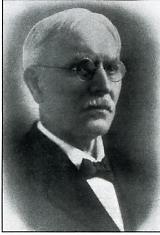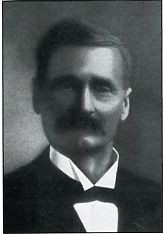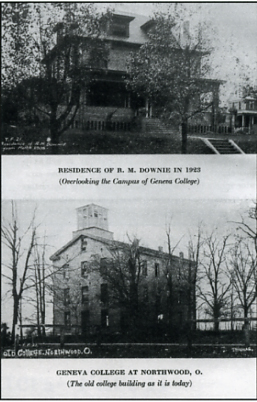
R. M. Downie
Click Here to Return to Milestones
In penning this, I must first disclaim tribal
hubris, for the man named above is my paternal grandfather, something
for which he might not be wholly pleased and for which I can claim
no credit.
Yet this is written, however, by request and because there is
a lack of historical data about the details, the precipitating
factors that transported Geneva College from an Ohio backwater
of the frontier to an unknown rural village in western Pennsylvania.
To better grasp the tale I tell, recall that in 1879, the year
in question, the local scene was nothing at all like we have around
us today, for:
1. That railroads had only come to the area 25 years previously.
2. That Beaver Falls, only extended up to 24th street, and was
farm country north of that. What would only later become College
Hill was actually three farms, among them the Partington and White
tracts.
3. The Civil War had been fought only 30 years previously.
4. There were no paved roads, telephones, or TV. Newspapers existed
but telegraph was the cutting edge of electronic technology at
that time.
5. Rutherford B. Hayes was President and there were only 38 states
in the Union.
All of this makes the move we are considering only more, not less
mysterious, yet paradoxically more like the ways of Jehovah, which
are more mysterious but just as clearly involved here.
With this as backdrop, we might be helped by a review of the principal
parties in this adventure.

Robert McGee Downie (Hereafter RMD) (1) was the son of James Niblock
Downie and Jane Boyle Magee and was born August 21,1853 on a farm
south of Valencia Pa.. A committed Christian , his early ambition
was to attend the Reformed Presbyterian Seminary in Pittsburgh.
His younger brother, John L. Downie, however, had a profound mechanical
gift and had set up a small machine shop on their father's farm
at what later became Downieville, which lies south of Valencia
on the border between Butler and Allegheny counties. Somehow,
RM found himself trying to earn money for his education by drilling
for coal or water with a "spring pole". This was exhausting
hard work. Yet the Scots had long since figured it was easier
to build a machine and let it work, then get the greater satisfaction
from watching the machine and oiling carefully, rather than exerting
one's self overmuch.; A Scot, James Watt, is usually given credit
for "inventing" the steam engine, Thus RM, doubtless
with the aid of his brothers James and John, whose mechanical
genius was equalled only by John's capacity for alcohol, bolted
a boiler and steam engine on a farm wagon, and rigged it so the
stroke of the cylinder drove a wheel that in turn was linked to
a walking beam with an up and down motion that pulled the drill
string up, then fell to allow the tools to drop into the bottom
of the well and crush whatever was there into a paste, which was
the mud brought up that lies about the well head.
The value and uniqueness of this was that the drill was portable,
and did not require expensive and immobile scaffolding like that
of Drakes Well to function. it was this portability that made
the Keystone Driller Company a success over the next fifty years.
The Reformed Presbyterian Church of North America was a Calvinist
Scots-Irish denomination whose members immigrated from Ireland
and Scotland in the 1700's. The original immigrants set up congregations
in Philadelphia and New York, but the westward migration begun
in the late 1700's brought them over the Alleghenies, so RP congregations
sprung up in the Piedmont, and a Seminary was set up in Pittsburgh
in the early 1800's. A RP congegation was established in Beaver
Falls( 2) and the brick and mortar still stand at the comer of
9th ST and 7th Ave.
Geneva College was founded in 1848 in Northwood Ohio, following
the westward move of the early settlers. Another area of relatively
settled information are happenings recorded in College documents
and other places. ( 3) These, as it were, are the matrix within
which the argument rests.
1. RMD enrolls in Geneva at Northwood, Ohio in 1877.
2. The Economite well was drilled by RMD with Jacob Henrici in attendance in 1878.
3 At some undated point, the Pres. of Geneva, H. H. George, felt the college could not grow at Northwood and expressed the need to relocate the college.
4. In 1879 the Synod of the Reformed Presbyterian Church appointed a committee to explore for places to which Geneva might be moved from Northwood.
5. In 1879 Somehow, Jacob Henrici communicated an offer to the Synod to give 10 acres to the College if it would relocate there and operate regular College level classes.
6. In 1879 Synod accepts Henricis' offer of 10 acres and acts to raise $20,000 to fund construction of Old Main. $17,000 is raised and at a picnic that summer of 1879 the balance was raised or pledged.
7. I879-1880 Northwood campus moves to Beaver Falls.
8. Construction of Old Main begins summer of 1879.
9. A deed is delivered and recorded in November 1777 for the 10 acres
10. RMD graduates from Geneva in the first class in 1881.
Two other matters are collateral to this
writing but should be noted:
First, the Economite Settlement on the Ohio is obviously involved
in this tale, but it has a well developed history that needs no
expansion here, save to say that they had saved up quite a bit
of money, and had started various business and things mechanical,
so one can easily hypothesize, - as more likely than not - that
while the horses grazed nearby, while the drill bits ker-chunked
rhythmically five or six strokes per minute, as the puddle of
mud around the spudding pipe grew, and the sun rose slowly overhead,
the two men seized that sacred occasion to ..."shoot the
bull" as men - and some ladies - do at such times.
It would have arisen in that chat, then, that RMD was a prospective
preacher, but the College he was attending was dying on the vine
and needed a new home. The Economites were well invested in the
area, so it would follow that Henrici might have said:" "Vell,
if it vould help, ve haf farm land north of Beafer Falls, and
we could gif you enough to put a College on." and that began
the whole thing, Geneva was swung from Northwood to Beaver Falls.
Strange as this assertion might be - as being more likely than
not - History is full of things more strange. Thus RMD told H.H.
George, H. H. spoke to Synod people and the "deal" moved
forward, for the records available reveal NO OTHER NEXUS between
the Covenanters, on the one hand, and the Economites on the other.
yet they obviously came together in the move we consider here.
That mud girt wellhead was the pivot around which the future of
Geneva College swung.
Now I turn to further matters that circumstantially support my
case.
Three men; H. H. George, David McAllister, and RM Downie were
involved in Geneva at Northwood, Geneva at Beaver Falls, and were
among the seven men who incorporated Keystone Driller on Feb 2.
1882 at the McCanlis Jewelry Store in Beaver Falls, a block or
so North of the RP Church of which RM was a member. A kind of
team if you will. RMD remained close to Geneva, first building
a house at the comer of 32nd ST. and 4th Ave, now demolished,
then the larger brick structure that stands on a bank on 32nd
st. and College Ave that is called Alumni Hall.
To add a facet to the preceding paragraph, it is a bit of family
history embedded maybe in a letter or a miscellaneous writing,
that H. H. George as bought land in the County, some of it in
Beaver Falls, and that is where the 10 acres that induced the
move came from. The Economites were interested in and supported
what we would now call "economic development" so had
a positive attitude toward "growth", and that feeds
into the argument as I will show in a bit.

Second. How do we know, and how do we accept something as certain?
A broad topic indeed, and one that humanity has pondered and fought
over for eons. I will, therefore, immediately curtail the dispute
by outlining a specific way of handling it, as developed by the
legal system. First, in any dispute, the person advancing an argument
carries the "burden of proof', or the "burden of persuasion",
as I am doing here. In civil cases, the least acrimonious arena
in the court system (usually) the burden is called: "simple
preponderance of the evidence". In other words, "it
it more likely than not" that a certain matter is true. I
argue here then, that it is "more likely than not" that
RMD was a pivotal actor in the matter. To that I now turn.
And I turn to 1877. Then the Industrial Revolution was but nicely
started. Steam power was new, competing with water power. Gasoline
and diesel engines lay in the future. The steel industry was nicely
started and blast furnaces and Bessemer Converters had replaced
the older stone iron furnaces. The telegraph was new, but "electric
lights" lay a couple of decades down the road. Radio would
wait for forty or more years.
Thus most wells were still "hand dug" by pick and shovel,
embedding as a memorial in our tongue: "colder than a well
diggers......" And as slow as a farm wagon may have been,
it was the fastest vehicle about, save for Railroads, so RMD more
likely than not, harnessed a team and drove from the family shop
at Downieville, down through the breaks of the Ohio to the Economite
settlement to drill a well. How Lenz got hold of RMD to arrange
for it is wholly unknown at this point. Remember that the drill
arrangement was the "NEW THING" at that time. Literature
from the Economites reveals that Lenz had a bent for technology.

(1)While RMD was very successful in business,
he suffered greatly in personal tragedy. His wife, Ann Vale was
burned to death in a gas explosion and RMD was badly burned as
well. Their youngest son, John Lincoln Downie was killed in WWI.
(2)The original name of the settlement on the Beaver River was
"Brighton". The next settlement across the Beaver and
downstream a bit was thus called "New Brighton", For
some reason this first "Brighton" was changed later
to "Beaver Falls."
(3) Two documents are helpful in giving a background information
regarding Geneva College. First, THE HISTORY OF GENEVA COLLEGE,
by David Carson. Available at Geneva College Bookstore. Second
the STORY OF KEYSTONE DRILLER by J. Vale Downie, out of print,
copies in McCartney Library.